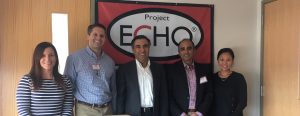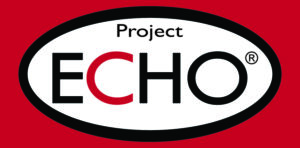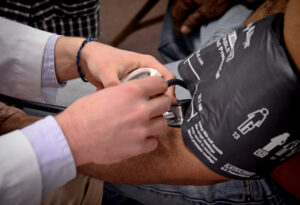In order to provide the highest level of care, a collaboration between the University of North Carolina, Duke University, and Wake Forest University is looking to revolutionize atrial fibrillation care through two virtual education programs. Our first program, The Atrial Fibrillation and EKG Interpretation TeleECHO Clinic, is structured to provide a strong multi-disciplinary model of collaborative care to primary care providers so they can more effectively address the complex needs of their atrial fibrillation patients. More information about this project can be found under the The Atrial Fibrillation and EKG Interpretation TeleECHO Clinic tab below.
The Atrial Fibrillation and EKG Interpretation TeleECHO ClinicLink to Provider Project Echo Page:
What is the Project ECHO model?

Project ECHO (Extension for Community Healthcare Outcomes) is a guided-practice model that aims to increase workforce capacity by sharing knowledge. Specialists/experts at the “hub” site meet regularly with providers in local communities via video conferencing to support these providers in the delivery of specialty care services. It has been described as a type of “virtual grand rounds”.
The ECHO model, developed at the University of New Mexico Health Sciences Center, does not provide care directly to patients. Instead, it provides front-line clinicians with the knowledge and support they need to manage patients with complex conditions in the patients’ own communities. It also helps ensure that all providers are up to date on the latest treatment and patient support options available. This dramatically increases access to high quality, specialty treatment, particularly in rural and under served areas.
Since the start of Project ECHO in 2003, the model had greatly expanded and has been implemented by over 110 partners- both in the U.S. and internationally- covering more than fifty-five complex conditions and problems. For more information, please visit: https://echo.unm.edu.
Core Principles of Project ECHO
The core principles of AF management and EKG interpretation will be covered. The ECHO model develops knowledge and capacity among community-based providers through:
- Using technology to leverage scarce resources
- Sharing best practices to reduce disparities
- Using case-based learning to master complexity
- Monitoring outcomes using a web-based database
How Does It Work?
A TeleECHO clinic is a virtual case-based learning environment. Healthcare providers from multiple locations connect at regularly scheduled times with a specialist or team of specialists through videoconferencing. During TeleECHO clinics, providers present de-identified patient cases to specialists and expert care teams who mentor the providers in managing patients with complex conditions. These case-based discussions are supplemented with short didactic presentations to improve content knowledge and share evidence-based practices. As a participating provider in the AF and EKG Interpretation TeleECHO Clinic, you can:
- Present and receive expert feedback on your challenging AF or EKG cases
- Enhance your ability to extend AF specialty care to your patients
- Reduce the need to refer patients out of your system/community for care
- Reduce your patients’ travel time and wait time for specialty care
Click here to learn more about how the TeleECHO clinic works.
Are you a current ECHO particpant?
Are you a health care provider looking for the current Echo participant materials? This page is deticated to explaining our current virtual education projects. Our ECHO project materials can be found under Provider Echo Page.
Our second virtual education series, AFib at Home, is structured to provide information, education and support to atrial fibrillation (AFib) patients directly. This virtual program was designed with the intention to empower AFib patients to become informed and active participants in their own AFib care plans. For more information about this project, expand the AFib at Home tab below.
AFib at Home
Project details
Managing your atrial fibrillation (AFib) can be challenging. To better understand the needs of our patients, we are conducting a brief confidential online survey to examine how AFib has impacted your health, emotional well-being, and stress and whether you follow common recommendations for AFib care. In addition, our team of cardiology experts invite you to join a month-long (8 hours total) interactive virtual support program, “AFib at Home.” This program was designed to provide information, education and support to AFib patients.
You will be asked to complete online questionnaires that will ask about your knowledge, experience and concerns about managing your AFib. Completing this survey should take 30 minutes or less and will be completed two times, one month apart. You will then be offered the opportunity to participate in an online patient education group program for patients with Afib through virtual/telehealth group sessions. These sessions will be led by a cardiologist (Dr. Gehi) who specializes in the treatment of AFib and a team of multidisciplinary experts.
Goals of our research:
- Understand how patients are managing their AFib
- Educate patients through virtual provider-to-patient group sessions
- Improve self-monitoring and self-management strategies for AFib
Learning objectives for participants:
- Have a general understanding of AFib and treatment options
- Develop a strategy for medication management
- Understand the risk of stroke and options for stroke reduction therapy
- Develop an action plan for AFib episodes
- Understand the importance of maintaining a healthy lifestyle
- Understand the psychological and social impact of AFib
Project Sponsorship
The AFib at Home program has been created to help patients understand and participate in the management of their AFib. The creation of this program has been supported by a grant from the Bristol Myers Squibb Foundation and is a collaboration with the University of North Carolina at Chapel Hill, Duke University, and Wake Forest University.
Are you a Health Care Provider?
Are you a health care provider looking for the current Echo participant materials? This research project is centered around patient experiences and education. Our ECHO project materials can be found under Provider Echo Page.

